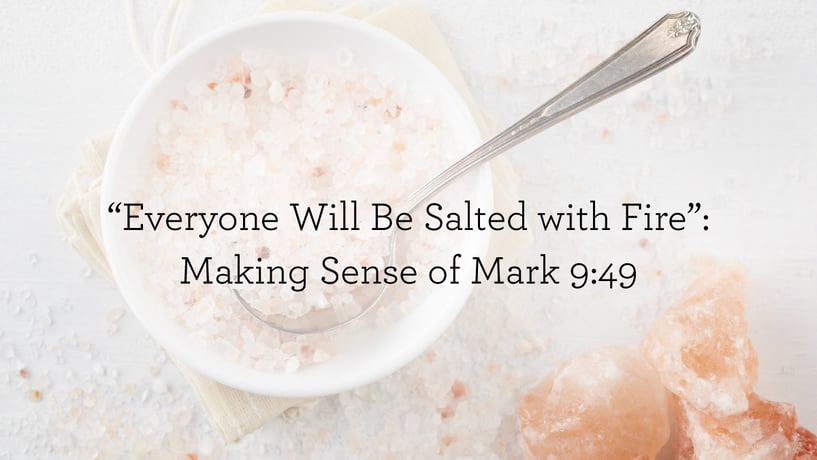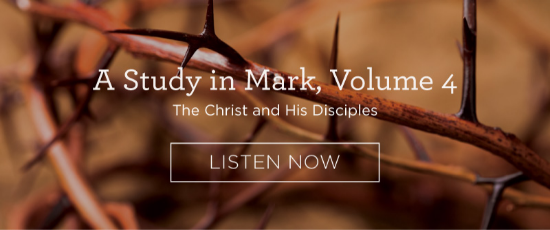
Many have described Christ’s words in Mark 9:49–50 as being among the New Testament’s most challenging passages. They read,
Everyone will be salted with fire. Salt is good, but if the salt has lost its saltiness, how will you make it salty again? Have salt in yourselves, and be at peace with one another.
These verses reinforce a familiar biblical theme: following Jesus is a serious business. Anybody who views Christianity as some kind of esoteric philosophical journey—a sort of crutch for the inept—must reckon with Jesus’ own claims. The call to following Him involves self-denial and suffering (Mark 8:34).
Jesus further clarifies the seriousness of discipleship in the verses immediately preceding the text in view (Mark 9:42–48). Warning against sin’s dangers, He doesn’t suggest that we negotiate with sin, trying to reconcile our sinful propensities with discipleship’s demands. Rather, He calls for its total eradication. We don’t toy with sin; we put it to death (Col. 3:5).
It’s clear that Jesus deals here with weighty truths. And it’s against the backdrop of verse 48 (in which He describes hell as a place where the “worm does not die and the fire is not quenched”) that His puzzling teaching on salt appears. With the costliness of discipleship and the picture of fire fixed in His disciples’ minds, Jesus asserts, “Everyone will be salted with fire.” How should we understand this peculiar phrase?
The Old Testament Background
The sacrificial system in the Old Testament is a good place to begin. It would’ve been familiar territory for Jesus and His audience. Establishing the design for grain offerings in Israel, God had made the following provision: “You shall season all your grain offerings with salt. You shall not let the salt of the covenant with your God be missing from your grain offering; with all your offerings you shall offer salt” (Lev. 2:13).
The call to following Jesus involves self-denial and suffering.
Further, these seasoned offerings were burnt offerings; they were consumed on the altar. In this sense, these Old Testament sacrifices were complete and irrevocable. Jesus appears to be reaching back to this practice, collating the pictures of fire and salt, to remind His followers that discipleship will involve a process whereby they’re “salted.” When they offer themselves to Christ’s cause, they will undergo a refining process, their allegiance to Him being complete and irrevocable.
Other places in the New Testament affirm this idea. In 1 Corinthians 3, Paul describes a similar refining process:
No one can lay a foundation other than that which is laid, which is Jesus Christ. Now if anyone builds on the foundation with gold, silver, precious stones, wood, hay, straw—each one’s work will become manifest, for the Day will disclose it, because it will be revealed by fire, and the fire will test what sort of work each one has done. (1 Cor. 3:11–13)
James also, when he writes, says, “There is only one lawgiver and judge, he who is able to save and to destroy. But who are you to judge your neighbor?” (James 4:12).
In other words, we’re moving toward a day, and that day will reveal whether we are among those who have taken seriously Jesus’ call to discipleship—whether we’ve responded in a correct fashion to the seasoning, refining process meant for all who follow Him.
What Good Is Unsalty Salt?
“Salt is good,” Jesus continues. “But if the salt has lost its saltiness, how will you make it salty again?” It’s a good question. Salt was vital in that day, regarded as a necessity. It was “good” in the sense that it was multipurpose, used for preserving, purifying, and seasoning.
When Jesus speaks of salt losing its salty quality, He’s referring to the method of mining salt unique to that period and region. People would harvest salt from either the Dead Sea or from the salt pans, and in those salt pans the water evaporated. In that process, the pure salt would leech out, leaving a residue of other minerals and causing the salt to “lose” its saltiness. So, Jesus poses the question to His disciples, “What good will you be if you lose your saltiness—if you succumb to the things that leech the salt out of your lives?”
History is moving toward a day on which Jesus will reveal whether we’ve taken seriously His call to discipleship.
In our own lives, there are certain things that threaten to dissipate the very qualities which make us distinct. They’re tendencies like running toward sin rather than fleeing from it, embracing personal comfort over costly discipleship, etc. (See Mark 8:35; 9:43–47.) In a word, Jesus warns us against losing the properties that make us useful.
The picture suggests that as disciples, we’re meant to make an impact on society, preserving it in some measure, exercising a purifying influence, and adding flavor—unless, of course, the purity of the Gospel is lost in our own lives. When this happens, we become like salt that has lost its saltiness: ineffectual, unable to fulfill our duty as Christians. It’s a tragic thing when a believer loses his way, his influence dissipating because he’s failed to take seriously Christ’s warnings concerning sin’s dangers.
The Salt of Peace and Unity
There’s a logical progression in Jesus’ language. He’s drawing several principles from the one metaphor. “Everyone will be salted with fire”—that’s the refining process through which all disciples will go. And then, in the beginning of verse 50, we’re warned, Don’t lose your distinctiveness as a disciple. You’ll end up like salt that has lost its unique properties. He then concludes with a final application: “Have salt in yourselves, and be at peace with one another.”
This final directive almost sounds anticlimactic after so dramatic a chapter—but not if we think about it! If the Gospel is the saltiness of the Christian life, then it is the Gospel which unites one Christian with another. When believers fight with one another, we lose the opportunity to be salt in a community that’s consumed with fighting. We lose the opportunity to be known as Christ’s disciples by our love for one another (John 13:35).
As we love one another, living at peace, a watching world robbed of peace will have occasion to ask us, “How do you live at peace with each other?” And we’ll be able to respond, “It isn’t because we are uniform, one just like another. It’s because the key to peace is to be Gospel-centered.”
What is at the heart of Jesus’ message in these difficult verses? We dare not treat sin casually. Be aware that we must be refined continually. Only then may we make a meaningful impact on those around us, ever growing in our peace and unity with one another.
This article was adapted from the sermon “Salted with Fire” by Alistair Begg.
Topics: Articles
